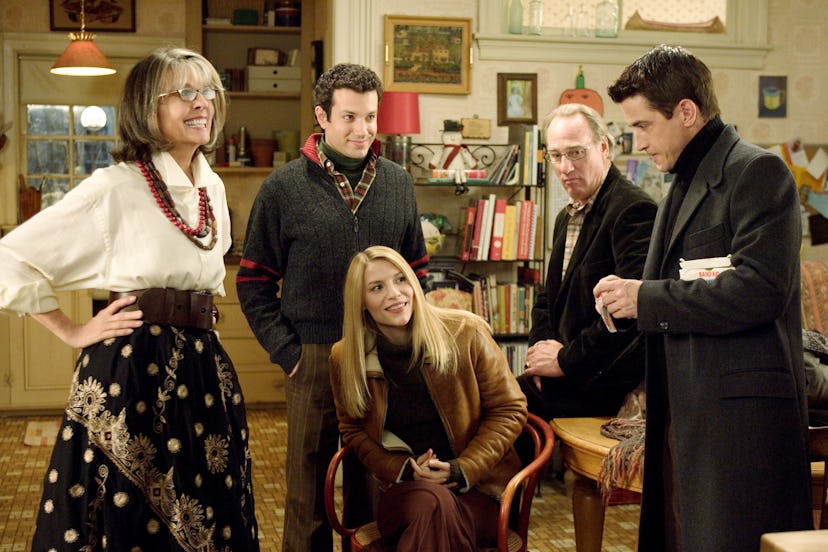When The Family Stone hit theaters in 2005, audiences expected another cozy holiday rom-com — the kind filled with snow, romance, and family squabbles that resolve neatly by Christmas morning. What they got instead was something deeper, funnier, and unexpectedly raw: a story about love, grief, and the messy, imperfect ways families hold each other together.
Written and directed by Thomas Bezucha, The Family Stone unfolds over a single Christmas as the sprawling Stone family reunites in their charming New England home. At first glance, the Stones are loud, warm, and effortlessly cool — the kind of family that finishes each other’s sentences and argues without malice. But when eldest son Everett (Dermot Mulroney) brings home his uptight girlfriend Meredith Morton (Sarah Jessica Parker), their easy dynamic turns into holiday mayhem.

A Clash of Worlds
Meredith is everything the Stones are not — polished, anxious, and perpetually out of her depth. From her awkward small talk to her stiff politeness, she seems doomed from the start. The family, particularly the quick-witted and judgmental Amy (Rachel McAdams), meets her with a mix of skepticism and teasing that borders on cruelty. The dinner table exchanges are painfully funny and uncomfortably real; anyone who’s ever brought a new partner home for the holidays will recognize that familiar, excruciating tension.
Desperate for moral support, Meredith calls her sister Julie (Claire Danes), whose arrival only complicates things further. Julie’s natural warmth and charm win over everyone — including Everett, who begins to question his engagement. Meanwhile, Meredith finds unexpected comfort in Everett’s younger brother Ben (Luke Wilson), the family’s laid-back peacemaker. What begins as holiday awkwardness slowly morphs into an emotional tangle of misplaced affection, self-discovery, and quiet heartbreak.

The Heart Beneath the Humor
At the center of it all is Sybil Stone, the family matriarch played by the incomparable Diane Keaton. Sybil’s commanding presence and dry wit keep her family orbiting around her, even as she hides a devastating secret: she is battling terminal cancer. Her illness adds an undercurrent of melancholy to the festive chaos — the unspoken awareness that this might be their last Christmas together.
Keaton’s performance is quietly extraordinary. She captures the strength of a mother trying to hold on to her family’s joy while accepting the inevitability of letting go. In one particularly poignant scene, Sybil looks at her family around the dinner table — laughing, arguing, living — and we see in her eyes the bittersweet beauty of the moment. It’s this emotional honesty that elevates The Family Stone beyond its genre trappings.
Love, Loss, and Acceptance
What makes The Family Stone endure nearly two decades later is its refusal to simplify human relationships. It’s a film about acceptance — of others and of ourselves. The Stones’ liberal, open-minded ideals don’t make them immune to judgment or hypocrisy, just as Meredith’s buttoned-up demeanor hides her genuine longing for connection. Everyone in the story is flawed, vulnerable, and learning.
The film explores love in all its forms — romantic, familial, unconditional — and how it often exists alongside frustration, misunderstanding, and loss. The moments of reconciliation feel earned, messy, and real. It reminds us that family isn’t about perfection; it’s about showing up, again and again, even when it’s hard.
Legacy and Reception
Upon its release, The Family Stone received mixed critical reviews. Some critics praised its wit and emotional depth, while others found its tonal shifts jarring — veering too abruptly from slapstick to heartbreak. But audiences embraced it, and time has been kind to Bezucha’s film. What once seemed uneven now feels authentic — the way real life swings between laughter and tears without warning.
The movie grossed over $92 million worldwide on an $18 million budget, becoming a surprise holiday hit. Over the years, it has evolved into a modern Christmas classic, rewatched annually by fans who find new meaning in its mix of chaos, love, and catharsis.
Why It Still Resonates
In an era of slick, feel-good holiday movies, The Family Stone stands out because it refuses to tie every bow neatly. It’s about what happens when we confront our own biases, face the people we’ve hurt, and realize that love — whether between partners, siblings, or parents — is fragile but worth fighting for.
Nearly 20 years later, the Stones still feel like people we know. Their imperfections make them unforgettable, and their story — funny, flawed, and full of heart — reminds us what the holidays are really about: forgiveness, acceptance, and the fleeting beauty of being together.
News
“WE NEVER IMAGINED IT WAS THERE ALL THIS TIME” — Backyard Discovery Confirms Vict:im in Infamous Victorian Mur-der Case
A homicide squad investigation is under way after tradies unsuspectingly dug up human remains in a backyard on Victoria’s Phillip…
“I AM INNOCENT — THEY ARE LYING ABOUT ME”: DJ Warras Accused Breaks Silence in Court as Bail Hearing Erupts With Sh0cking Claims
Victor Majola’s lawyer wants access to the State’s video evidence, as his client’s bail application continues. Image: @4Inside_Edge Source: Twitter…
“I DIDN’T PULL THE TRIGGER” — DJ Warras Mur-der Case Takes Sh0cking Turn as Victor Majola Applies for Bail and Courtroom Secrets Spill Out
The murder case of DJ Warras took a dramatic turn this week as accused Victor Majola appeared in the Johannesburg…
DJ Warras K-i-l-l-er Busted! Court Hearings Reveal Explosive Secrets Linking Victor Majola Directly to Mur-der and Conspiracy
The courtroom was tense as Victor Majola appeared before Johannesburg Magistrate’s Court this week for his bail application in the…
Katie Price Leaves Fans Shocked by Fragile Look While Walking with Daughter Princess Andre, But a Single Moment Shows Strength and Reconnection Behind the Headlines
Frail and almost unrecognisable, Katie Price has finally been pictured reunited with her daughter Princess Andre, months after a bitter fallout sparked by…
DEVASTA:TING HEARTBREAK AS NSW P0LITICIAN KEVIN ANDERSON REVEALS FINAL MOMENTS WITH WIFE ANNA BEFORE HER SUDDEN PA-SSING — Nation Left Stunned
The MP is stepping back from his duties while he and his family grieve. Tragedy has rocked a prominent New South…
End of content
No more pages to load












